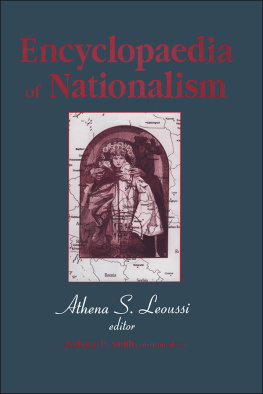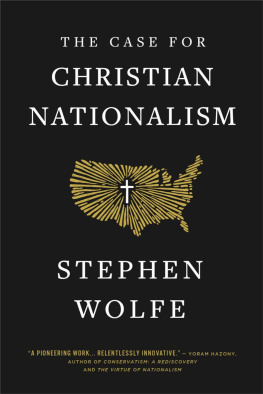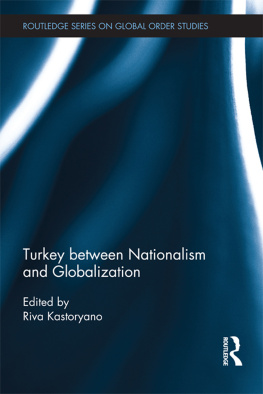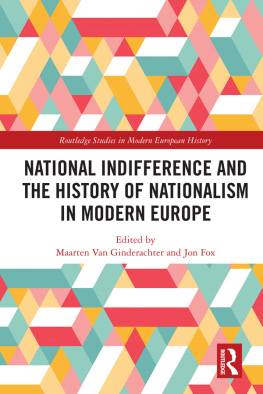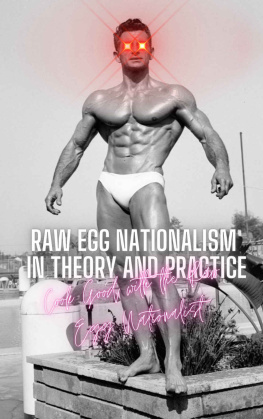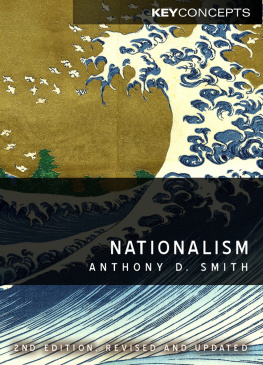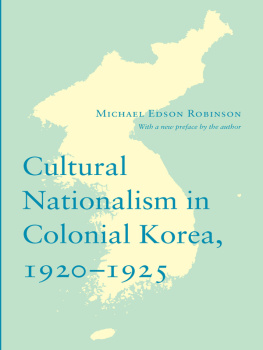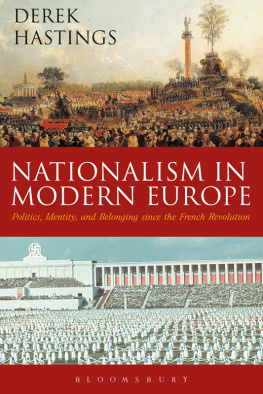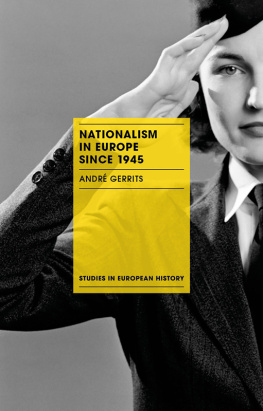First published 2001 by Transaction Publishers
Published 2017 by Routledge
2 Park Square, Milton Park, Abingdon, Oxon OX14 4RN
711 ThirdAvenue, New York, NY 10017
Routledge is an imprint of the Taylor and Francis Group, an informa business
Copyright 2001 by Taylor & Francis.
All rights reserved. No part of this book may be reprinted or reproduced or utilised in any form or by any electronic, mechanical, or other means, now known or hereafter invented, including photocopying and recording, or in any information storage or retrieval system, without permission in writing from the publishers.
Notice:
Product or corporate names may be trademarks or registered trademarks, and are used only for identification and explanation without intent to infringe.
Library of Congress Catalog Number: 00-048403
Library of Congress Cataloging-in-Publication Data
Encyclopaedia of nationalism / Athena S. Leoussi, editor ; Anthony D. Smith, consultant advisor.
p. em.
Includes bibliographical references and index.
ISBN 0-7658-0002-0
1. Nationalism-Encyclopedias. 2. Nationalism-History-Encyclopedias. I. Leoussi, Athena S., 1959-
JC31 I.E499 2000
320.5403-dc21 00-048403
ISBN: 9781351327169 (ebk)
The image on the cover of this book is emblematic of the continuing and formative role of nationalism in the cultural and political history of the modern world. It also crystallizes in a synthetic image the fluidity of concepts of national culture and national solidarity. It shows the geopolitical maps of the new states of the Czech Republic and of Slovakia against the backdrop of an image of the older state of Czechoslovakia which they succeeded, personified as a young girl in folk, Czechoslovak costume. The two new states emerged on the political landscape of Europe on 1 January 1993. They were the result of the fragmentation of the larger state of Czechoslovakia, itself founded not so long ago, in 1918. That older state had united into a single nation, and under a common political roof, the Czechs and Slovaks who, at the time, believed that they did, indeed, have a common identityand that they therefore belonged together and apart from the even earlier, Austro-Hungarian Empire which they considered their prison. Alphonse Muchas image of young Czechoslovakia dressed in national costume and celebrating her tenth anniversary in 1928, reminds us of that earlier conception of national identity which gave rise to Czechoslovakia and which was to change within a period of seventy-five years into a conception of the distinctiveness of the Czech and Slovak nations.
To say, as it has been said, that Czechoslovakia was, in actual fact, a manage de convenance of Czechs and Slovaks does not adequately explain the divorce, nor indeed the wedding. Instead, it raises a fundamental issue, that of the role of culture in social relations and, as crucially, in political associations.
It was Emile Durkheim who saw most clearly that culture, which he called conscience collective, unites. If we were to accept Durkheims observation that culture unites its adherents into a community called a church, this sociological fact does not provide an adequate solution to the modern problem of state-formation which is the problem of political legitimacynot only the legitimacy of governments, but also, the legitimacy of state borders. In relation to the latterhow should political communities be delimited?the modern belief that a cultural community should define a state has thrown into high relief, first, the complexity of the notion of culture; and second, the relationship between church (in this wider sense of a moral community, a group of people holding the same moral values) and state as two distinct domains of human social organization and endeavor.
Although state-formation of the democratic variety includes some of the ingredients of Durkheims religious community, a consensus on values, and some of the tendresse of its Gemeinschaft, it is not identical with it. Indeed, the modern, ideological and indeed liberal distinction between Church and State has to be maintained analytically, in order to obtain a clearer understanding of the cultural politics of our timethat is to say, an understanding of modern nationalism.
Wherever the link between culture and politics has been pursued in practice, it has led to some important theoretical as well as practical qualifications and words of caution. Firstly, and as Elie Kedourie has correctly observed, the general will, in the sense of a common culture, is difficult to define. It is especially difficult to delimit the boundaries of a common culture and to do so for political use: for drawing the frontiers of states. Secondly, the nation-state often involves an element of cultural coercion. The assumption by the state of a cultural role involves, not only the protection by the state of a culture and its bearers, but also the imposition of this culture on a population which is not always culturally homogenous. This element of coercion is felt among national minorities and free-thinkers alike. The transformation of a particular culture into the culture of the state makes that culture compulsory and thus removes the element of freedomthe freedom of conscience and associationwhich characterizes all cultural communities. Thirdly, if culture means a variety of manifestations of the mind, and at least language and religion, then as the historical record indicates, these two quite different phenomena are not always, either coextensive or harmonious from the point of view of their social bases. For example, linguistic communities have often been divided by religion and even irrligion (a secular cast of mind); and religion has often united linguistically diverse communities. Fourthly, a common language, as indeed a common religion, is neither necessary nor sufficient motivation for political association. And fifthly, the very concept of a common language is difficult to define not least because languages exist in different dialects. The disappearance of Czechoslovakia from the political map of Europe exemplifies all these problems. It also indicates the interaction between culture and other factors of common experience in forging bonds of national solidarity and hence states. The different political and economic histories of linguistically related communities may impede the growth of sentiments of national solidarity and political commitment.
The visual consideration of the history of Czechoslovakia on the cover of this volume is also in memoriam of that great contemporary scholar of nationalism, the late Ernest Gellner (1925-1995) who was born in Prague, and returned there, after retiring from the University of Cambridge, to found a Centre for the Study of Nationalism. Gellners place lies not above that of all others, but at the center of a community of many distinguished students of the subject all of whom have considered it necessary, if not imperative, to engage, at one time or another, in intellectual conversation with his thought, in either agreement or constructive opposition.
The dissolution of Czechoslovakia and its replacement by two new, independent, and just as national states, is not the only raison dtre of the present volume. In fact, the case of Czechoslovakia inscribes itself in a much wider politico-cultural transformation of our time, the dissolution of the USSR. The end of the internationalist Soviet experiment in 1989 and the resurgence of nationalism which succeeded it throughout the former Eastern bloc have given a new impetus to the field of nationalism studies. Until then and for almost exactly two hundred years starting with the French Revolution, the world had been faced with two options, two systems of political, cultural, and economic organization: liberal-democratic nationalism and socialist internationalism. For a while the choice was hard to make. It was not a choice between good and evil but a much more fatal choice as Isaiah Berlin has remarked, a choice between two goodsequality and freedom. In 1945, with the end of the Second World War, the world finally became divided, almost equally, between the two options, and politicians, the academy, and the press spoke of a new balance of powers: Eastern communism and Western liberal democracy. And the two worlds, East and West, appeared as

